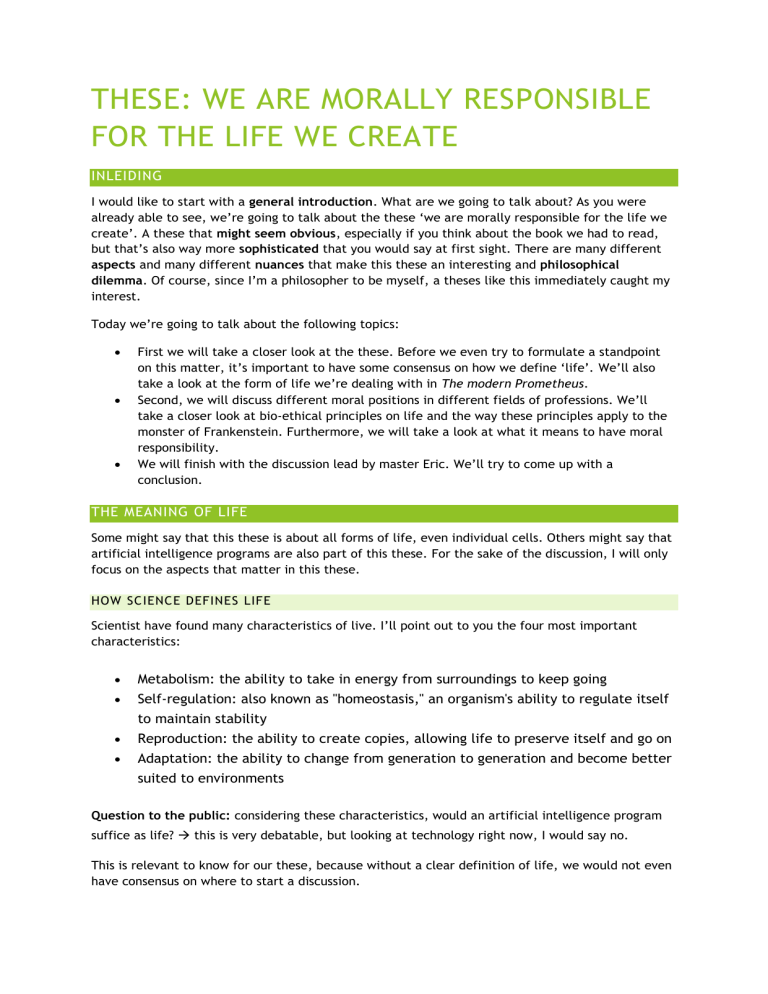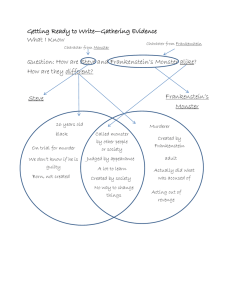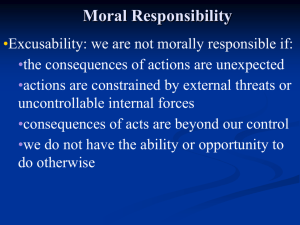
THESE: WE ARE MORALLY RESPONSIBLE FOR THE LIFE WE CREATE INLEIDING I would like to start with a general introduction. What are we going to talk about? As you were already able to see, we’re going to talk about the these ‘we are morally responsible for the life we create’. A these that might seem obvious, especially if you think about the book we had to read, but that’s also way more sophisticated that you would say at first sight. There are many different aspects and many different nuances that make this these an interesting and philosophical dilemma. Of course, since I’m a philosopher to be myself, a theses like this immediately caught my interest. Today we’re going to talk about the following topics: First we will take a closer look at the these. Before we even try to formulate a standpoint on this matter, it’s important to have some consensus on how we define ‘life’. We’ll also take a look at the form of life we’re dealing with in The modern Prometheus. Second, we will discuss different moral positions in different fields of professions. We’ll take a closer look at bio-ethical principles on life and the way these principles apply to the monster of Frankenstein. Furthermore, we will take a look at what it means to have moral responsibility. We will finish with the discussion lead by master Eric. We’ll try to come up with a conclusion. THE MEANING OF LIFE Some might say that this these is about all forms of life, even individual cells. Others might say that artificial intelligence programs are also part of this these. For the sake of the discussion, I will only focus on the aspects that matter in this these. HOW SCIENCE DEFINES LIFE Scientist have found many characteristics of live. I’ll point out to you the four most important characteristics: Metabolism: the ability to take in energy from surroundings to keep going Self-regulation: also known as "homeostasis," an organism's ability to regulate itself to maintain stability Reproduction: the ability to create copies, allowing life to preserve itself and go on Adaptation: the ability to change from generation to generation and become better suited to environments Question to the public: considering these characteristics, would an artificial intelligence program suffice as life? this is very debatable, but looking at technology right now, I would say no. This is relevant to know for our these, because without a clear definition of life, we would not even have consensus on where to start a discussion. FRANKENSTEIN Would Frankenstein’s monster meet the requirements of life? The creature was made out of dead body parts. We could say that the monster’s body is dead. But does that mean that the monster is not alive? In some way, we are able to argue that Frankenstein’s monster is in fact alive. At least, it seems so. The monster can think for itself and can provide for itself. The interesting part here is that it is the moral consciousness that makes me say the monster is alive. His body might not be alive, the creature does have a consciousness that makes him a moral being. Now that we found what ‘life’ means, there is another interesting dilemma. That concerns moral ‘life’. When can we speak for a being to be ‘moral’? Philosophy gives us many different answers to this question. MORAL RESPONSIBILITY Moral responsibility is a difficult philosophical debate. There are many different positions, from ones that deny any form of moral responsibility to the ones that say we are even responsible for the acts of others. Despite this incredibly sophisticated debate, I will explain the position reason responsiveness. This is a position that has been defended by the most philosophers: People are morally responsible when they possess the capacity to answer moral reasons. For a person to be reasons-responsive, it must possess two qualities: 1. Moral understanding: de capacity to understand moral considerations; 2. Self-control: the capacity to see ourselves in the light of those moral considerations. WHAT MORAL RESPONSIBILITY DID FRANKENSTEIN HAVE WHEN CREATIN G THE MONSTER? Until now, we have been talking about whether Frankenstein is morally responsible for creating the monster or not. However, Shelly’s work covers more moral themes. We should also talk about the responsibilities one has after creating life, and that is where the real moral failure of Victor Frankenstein happened. The real moral failure was not in creating the monster, but in failing to meet or even consider the moral obligations he had to it. Frankenstein did not even bother to name his creature after creating it. Most philosophers agree on our moral obligations to acknowledge the moral status of other beings. Frankenstein refused to acknowledge his duties to his creation. Frankenstein’s creature was a morally conscious being. We learn to know that he is very sensitive, only looking for companionship. He learns to speak several languages, references classic literature, and reveals that he is a vegetarian for ethical reasons. It seems intuitive that the creature has some moral standing that is never recognized. The lesson we can learn from this, is that our moral obligations go further once we decide to create life. END – CONCLUSION Are we morally responsible for the life we create? Well, I would like to make a little nuance. We can divide this these in two different interpretations. 1. We are morally responsible for creating life in this case I would argue that we are in fact morally responsible. After all, creating life is not something we unconsciously do. When we intend to create life, like in scientific experiments, we make the moral choice to do that. We considerate different points of views and – assuming that we have free will – are responsible for the choice that we make. So, we are morally responsible for the act of creating life. 2. We are morally responsible for the actions of the life we created However, the matter is way more complicated when we say we are morally responsible for the actions of the life we created. This leads to very interesting implications. Say the former these is in fact correct. What would that mean if God existed. If there existed a God, that created us, we could never be morally responsible. After all, our actions are Gods responsibility. Besides that, I think it’s important to know whether the life we created is conscious or not. If we create a form of life that is capable of making its own moral decisions, how can we be morally responsible for the choices they make? HOW DO THESE DIFFERE NT INTERPRETATIONS A PPLY TO FRANKENSTEIN? In the first case, Frankenstein would be morally responsible. After all, he consciously and intentionally created the monster. The monster did terrible things. Can we say that these terrible things are eventually to blame on Frankenstein, since he created the monster? Here it gets tricky. Some might say yes. After all, Frankenstein could have known that there was a risk his project would turn out to be a monster. However, I would argue the opposite. The middle part of the book is written from the perspective of the monster itself. Therefore we are very well capable of knowing the monster’s emotions and thoughts. It seems that Frankenstein’s monster knew very well what he was doing and therefore is morally responsible for its own actions. we are morally responsible for the life we create Interpretation 2: We are morally responsible for the actions of the life we created Interpretation 1: We are morally responsible for creating life Moral responsibility exists YES Moral responsibility does not exist (e.g. we do not have free will) NO Moral responsibility does not exist (e.g. we do not have free will) Moral responsibility exists The life we created are morally conscious beings No/to some extend The life we created are not morally conscious beings NO YES DISCUSSION POINTS TO EXPLORE THE THESE (IF THERE IS ANY TIME LEFT): Do you think Frankenstein’s monster was reasons-responsive? One of Mary Shelly’s morals is that it is important to acknowledge your moral obligations to the life you created. Are you to blame if you would not be able to fulfill those obligations? o Are parents that live in poverty, and know in advance there circumstances won’t change any time soon, morally blamable when they have children? When we take a look at the nurture-nature debate, we see that moral behavior is something you learn from your caretakers. To what extend can we blame the creator of a living being, when this living being behaves immorally? o Who is morally responsible for the Monster’s actions? The Monster itself or Frankenstein? SOURCES Is the creation of artificial life morally significant? (nih.gov) Bioethics and the Character of Human Life (thenewatlantis.com) 240217 (srce.hr) The Concept of Life in Modern Medical Ethics and Bioethics Moral Responsibility (Stanford Encyclopedia of Philosophy) Life and the Ethics of Responsibility | Center for Humans & Nature (humansandnature.org) ‘U bent mijn schepper…' - Filosofie Magazine The ethics issue: Should we let synthetic life forms loose? | New Scientist Ethical and philosophical challenges in synthetic biology (researchoutreach.org) The Ethics Of Creating Synthetic Life : NPR The other moral in Frankenstein and how to apply it to human brains and reanimated pigs - Big Think Why issues raised in Frankenstein still matter 200 years later | Stanford Medicine Moral And Ethical Dilemmas In Mary Shelley's Frankenstein | ipl.org



